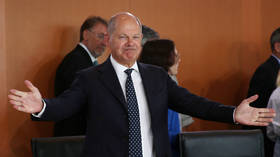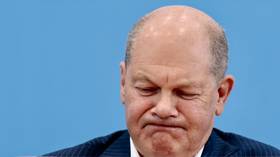German chancellor wants to end Ukraine conflict ‘faster’

German Chancellor Olaf Scholz has called for a renewed effort to bring an end to the conflict between Russia and Ukraine.
The leader made the remarks in a televised interview with state broadcaster ZDF aired on Sunday. “I believe that now is the time to discuss how to arrive at peace from this state of war, indeed at a faster pace,” he said.
Despite its initial reluctance to pour military aid into Ukraine, Berlin has become one of Kiev’s top backers amid the conflict. Germany has supplied the Ukrainian military with assorted hardware, including Leopard 1 and 2 main battle tanks, as well as Marder infantry fighting vehicles.
Scholz’s comments about achieving peace in Ukraine as soon as possible come as he continues to struggle with assorted domestic problems. According to a poll published by ZDF separately on Sunday, some 77% of Germans believe Scholz to be a weak leader, while only 17% speak favorably about his leadership qualities.
The poll has apparently marked the worst approval ratings shown by Scholz during his tenure, with some 74% of respondents believing the chancellor should not become the frontrunner for the Social Democratic party in the September 2025 federal election.
Scholz’s ruling coalition suffered painful setbacks during regional elections last week, showing poor performances in Thuringia and Saxony, in the former East Germany. The two major regions have seen the rise of the right-wing populist Alternative for Germany (AfD) and the recently formed left-wing populist Sahra Wagenknecht Alliance (BSW).
Both parties, despite being on the polar sides of the spectrum, strongly oppose Germany’s enduring involvement in the conflict in Ukraine, mass immigration, and related economic hardships blamed on the Scholz government.














